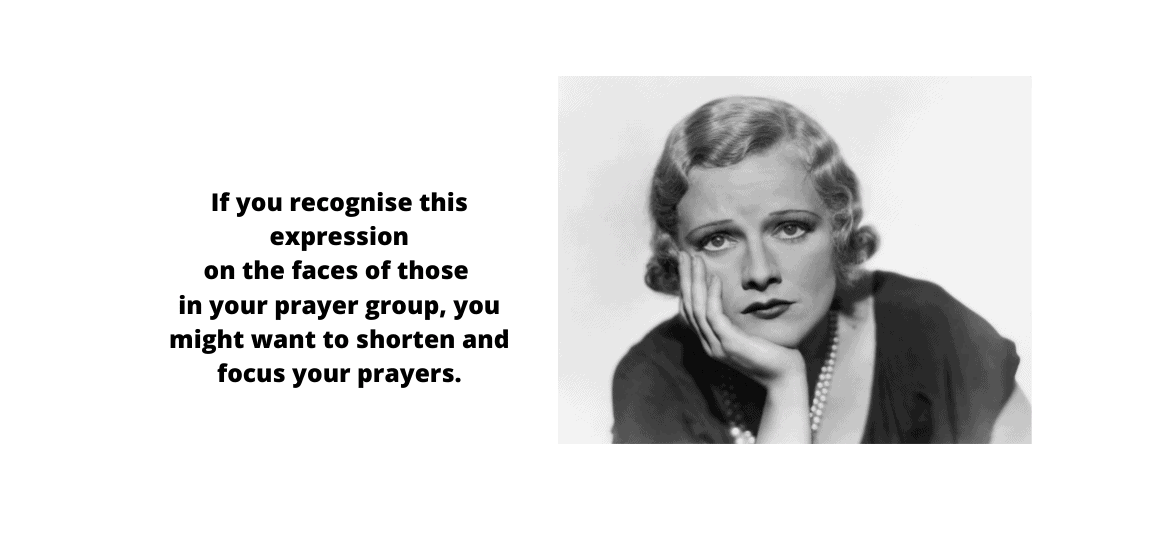For the most part, Jesus’ prayers were short and to the point when he healed, forgave or delivered someone. His most prolonged prayers were heard only by his closest companions. (John 13-17)
Perhaps I should write a book, “Caveman Prayers” by Katherine Walden.
“Heart, be at peace!”
“Arm, be healed!”
“Forgive me, Jesus.”
“Jesus, Iowa is hurting bad. How can I partner with you in this situation?” This sort of prayer requires you to listen for the answer and then to OBEY that directive. Use this prayer cautiously, as God will always take you up on your offer.
“Jesus, HELP!!”
You get the drift…
Hey, I have seen 28-page books on Kindle sell for 6.00 a pop. I could make millions. I’d save thousands of dollars as an editor or proofreader would have little content to check.
If you’ve been a Christian for more than a year or so, you’ve probably run across some old saint or not-so-old saint who feels it necessary to pray for every nuance of a situation. They gnaw and worry on that bone until there isn’t a lick of gristle on it. Their long preamble indicates that they will be ambling for a while. If that prayer happens to be around a dinner table, the cook knows to cover the hot dishes so they don’t get cold. If left unchecked, these dear people suck hope, faith, and motivation out of a prayer meeting.
A long prayer is often less effective than a short, focused prayer.
I have heard this adage more than once from several people I respect as mighty prayer warriors. “Don’t pray past the miracle.” I heartily agree. In general, I have found that the more extended a public prayer, the less focused that prayer becomes on its original target and the less likely those gathered will remain attentive and in agreement. Prayer meetings are not meant to showcase a person’s verbal skills or supposed prayer skillset; prayer meetings are intended to be a collective team effort to accomplish a specific task set before them.
God isn’t impressed by the length of a prayer, the poetic eloquence of the prayer (Luke 18:9-14), or how many Bible verses you can cram into a prayer. He is impressed by three things: Humility, Faith, and Trust.
Humility to wait on the Lord, asking Him for direction on how we should pray before a word comes out of a mouth. Humility to know we are beloved children of Father God and that he is well pleased with us. Therefore, we do not need the accolades of man as proof that we are prayer warriors.
Faith in the character of God. We do not have to manipulate God. We don’t need to come up with just the right combination of words or drum up the correct level of emotional enthusiasm to get his attention. Our faith lies in our confident belief that we serve a good God whose intent is always to bless and that He heals, restores, and transforms lives as we partner with Him in prayer.
Trust that He heard us. He heard us the first time and is already at work on our behalf. Trust that as we continue to pray as He leads and we are quiet in his presence, he will refine our prayers and sharpen our weapons of warfare, which goes back to my first point: humility. We aren’t praying to make a point. We are offering ourselves as HIS pointed arrows, righting what is wrong and creating space for the goodness of God to flood into bodies, homes, cities, and nations.
Prayer is not a sermon nor a platform to express your opinion. God does not need his arms bent. He is a good God who loves to do good things for His people. Prayer is not trying to change God’s mind so it fits your agenda. Prayer is partnering with God. While He invites us into His dialogue, He is still Lord and cannot be manipulated.
For prayer tips, please visit the prayer section of this website, Katherine Walden.
Sign up for my weekly email that not only includes a devotional but also seven quotes from prominent authors, speakers, and heroes of our faith. I do not use this mailing list for any other purpose!
Like what you read? You can help keep this ministry in several ways. Find out more HERE
Until Next Week,
©2020 Katherine Walden

